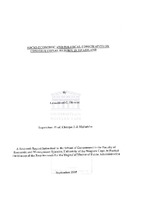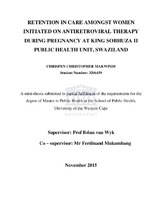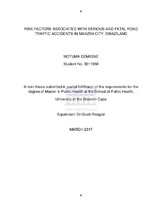| dc.contributor.advisor | Mphaisha, Chisepo J.J. | |
| dc.contributor.author | Dlamini, Lomakhosi G. | |
| dc.contributor.other | School of Government | |
| dc.contributor.other | Faculty of Economics and Management Sciences | |
| dc.date.accessioned | 2013-09-27T08:19:51Z | |
| dc.date.available | 2007/12/10 11:45 | |
| dc.date.available | 2007/12/10 | |
| dc.date.available | 2013-09-27T08:19:51Z | |
| dc.date.issued | 2005 | |
| dc.identifier.uri | http://hdl.handle.net/11394/2134 | |
| dc.description | Masters in Public Administration - MPA | en_US |
| dc.description.abstract | This study looked at socio-economic and political constraints on constitutional reform in Swaziland, an independent state with a fully autonomous government that falls under the Monarch who is Head of State. Swaziland maintains strong economic and trading links with South Africa and also maintains such ties with other states, especially in the Southern African Development Community region. Up untill 1973, the country's constitution was Westminister based. This was evoked and replaced with a system designed to facilitate the practice of both western and traditional styles of government. This system incorporated the system known as Tinkhundla and provides for the people to elect candidates to be their parliamentary representatives for specific constituencies. | en_US |
| dc.language.iso | en | en_US |
| dc.publisher | University of the Western Cape | en_US |
| dc.subject | Swaziland | en_US |
| dc.subject | Politics and government | en_US |
| dc.subject | 1968 | en_US |
| dc.subject | Constitional history | en_US |
| dc.subject | Constitutional amendments - Swaziland | en_US |
| dc.subject | Constitional law - Swaziland | en_US |
| dc.subject | Customary law - Swaziland | en_US |
| dc.title | Socio-economic and political constraints on constitutional reform in Swaziland | en_US |
| dc.type | Thesis | en_US |
| dc.rights.holder | University of the Western Cape | en_US |
| dc.description.country | South Africa | |




